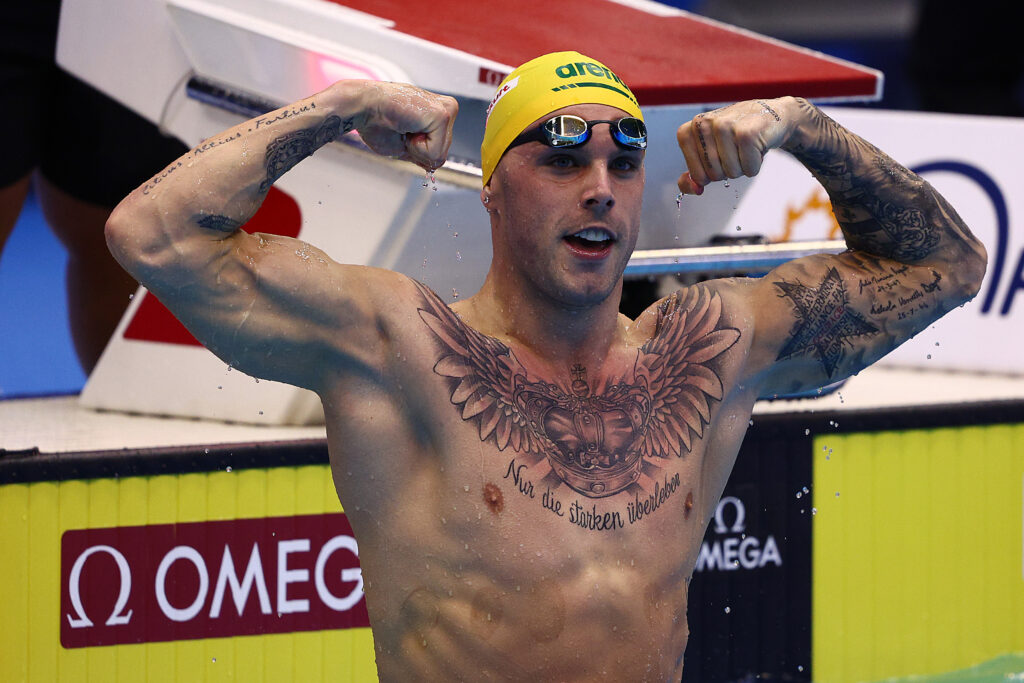Before the excitement, there is the mundanity. Before everyone is watching you, no one cares. These are the stark truths that apply to Tim Tszyu on this cool, windy November afternoon in a quiet pocket of the southern Sydney suburb of Rockdale, home to the grandly named Tszyu Boxing Academy, really the upstairs of a Police Citizens Youth Club. I was meant to meet the fighter here around lunch, but he’s running late and all I can do for a while is watch the occasional comings and goings – middle-aged guys fronting up for a hit of squash; younger dudes to shoot hoops. There’s no sense that a great athlete on the verge of a momentous feat is about to grace the place with his presence.
At last, Tszyu pulls up in his AMG-Mercedes with his striking partner, Alexandra Constantine, and his placid French bulldog, Pablo, and the trio heads straight upstairs to the austere gym that feels frozen in time. There’s a ring, of course, racks of dumbbells in one corner, a beaten-up sofa that Vinnies would reject, and a matted section where you stretch, jump rope, work the speed bag. But I can’t peel my eyes off the wall to the right, which is covered in posters from the heyday of Tim’s father, Kostya, the great Russian-born light-welterweight who held multiple world titles in the second half of the 1990s and early 2000s. While the resemblance between Kostya in his twenties and Tim now is well known, it never fails to amaze whenever it confronts you .
Tsyzu, 28, disappears into a small, adjoining room for a few minutes, re-emerges robed for action. “I actually love training now,” he says, taping his hands and repeatedly kicking a slobbery tennis ball for Pablo to retrieve and return. “I used to hate it. I love the grind now.”
His career thus far has been relatively smooth – smooth, that is, in the context of boxing’s brutal heart. Unbeaten in 21 bouts (15 KOs), he’s earned a showdown with the American champion Jermell Charlo, who holds four world-title belts in the super-welterweight division. If Tszyu can beat Charlo in Las Vegas on January 29 (AEDT), he’ll become just the ninth undisputed champ in the so-called four-belt era, dating to 2004.
The stakes are high. The pressure’s on. But there’s no one better equipped to cope than Tszyu, reckons Alexandra, who met him six years ago at a boxing class here; the two have been inseparable ever since. “Tim is zen-like,” she says. “It’s all about routine and not allowing any distractions.”
The Tszyu-Charlo bout conjures memories of Kostya’s famous fight with Zab Judah in November 2001. Like his dad, Tszyu will head to the US to face an uber-confident champion whom just about everyone expects to win. At 32, Charlo is the Real Deal. He turned pro at 17, has lost only once since, and has been a world champion since 2015, consistently figuring in discussions about the best pound-for-pound boxer in the world. “Look, he’s the man,” Tszyu allows. “He’s the man. But there’s no fighter that’s perfect. There’s always a weakness.” (Indeed, Kostya proved that yet again against Judah, stopping him in the second round. Judah was so enraged in the aftermath that, disgracefully, he grabbed the ref by the throat.)
Shortly, the rest of Tszyu’s inner circle saunters in. There’s his younger brother, Nikita, who’s boxing too. There’s his big-hearted, big-bellied grandfather, Boris (Kostya’s father) – “my rock,” says Tszyu. Boris seems uncomprehending when I introduce myself, walking away somewhat abruptly. Alexandra leans in with a word of advice: “He understands everything”. There’s Igor Goloubev, Tim’s uncle and trainer, a stern-looking man who’s nonetheless perfectly polite. Tszyu has spoken to me before about Goloubev, calling him the ultimate straightshooter, the opposite to a yes man. “He controls everything. He runs the show, plans everything out, studies my opponents, creates a game plan.”
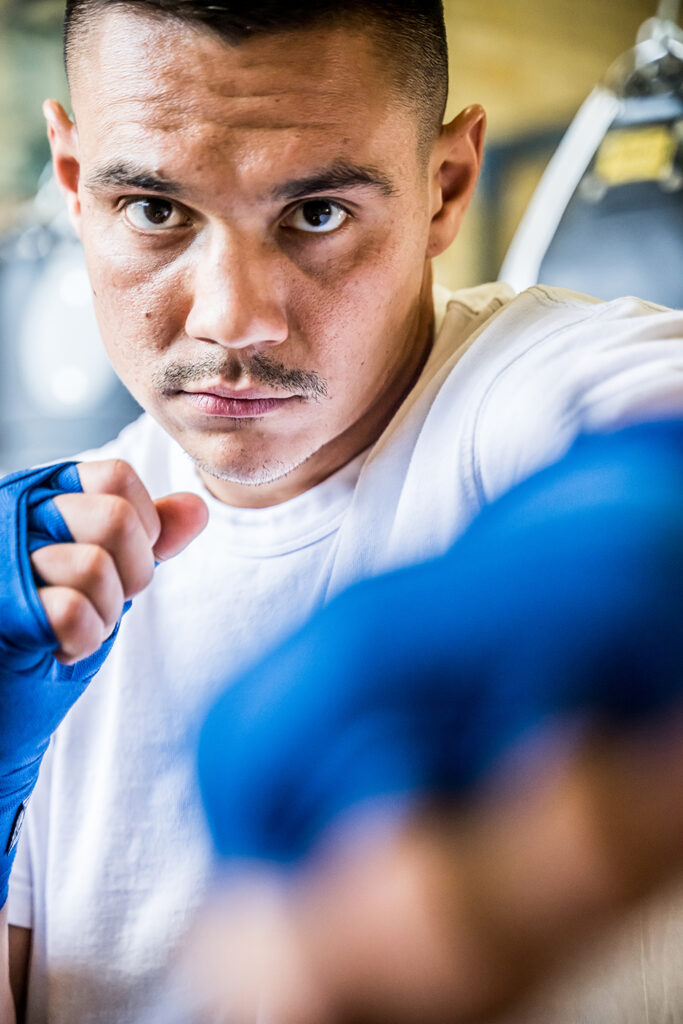
The game plan for Charlo will need to be a pearler; the execution every bit as good. Alexandra can allow her thoughts to drift to after the fight, to when “Tim is mentally and physically recovering from war” and the pair can escape overseas – to Hawaii, perhaps, for sunsets and coconut cake. For his part, Tszyu is focused on today, on the sparring session he’s about to begin, just as soon as he’s finished talking to Men’s Health.
Men’s Health: Do you see the parallels between your father’s fight with Zab Judah and what you have coming up?
Tim Tszyu: Sure. That fight was on my seventh birthday. [Judah was] brash, arrogant . . . had the swagger. Lots of hype. [Dad was] the underdog. There are a lot of similarities.
When you think about this fight of yours in Las Vegas, what do you feel?
The feeling is do or die. It’s a thrill not many get to experience, fighting for all four belts. But it’s do or die. Sink or swim.
What sort of shape will you be in?
Right now, I’m in crazy shape already. We’ve taken things back to old school. Everything’s perfect and I’ll be in the best physical and mental shape possible.
We hear that quite a lot from fighters . . .
Yeah, but I’ve never felt like this before a fight camp. It’s just a different feeling this one. This is the Super Bowl. This is the NBA clutch moment. This is the Olympic 100m sprint final.
No one doubts you’ll be fit. What about mentally? Are you stepping up that part of your training too?
Yeah. You know what? I’ve hired a mental coach. I’ve never believed in it, but I’ve hired a mental coach [Andrew May]. And he’s been able to relax me and help me to know when to shut it
off and learn to breathe through high-pressure situations. I guess we can resemble a lot of things. My favourite car is the ’67 [Ford Mustang] GT500 Eleanor and I see myself as that car. In this fight, the car is going to be perfectly tuned.
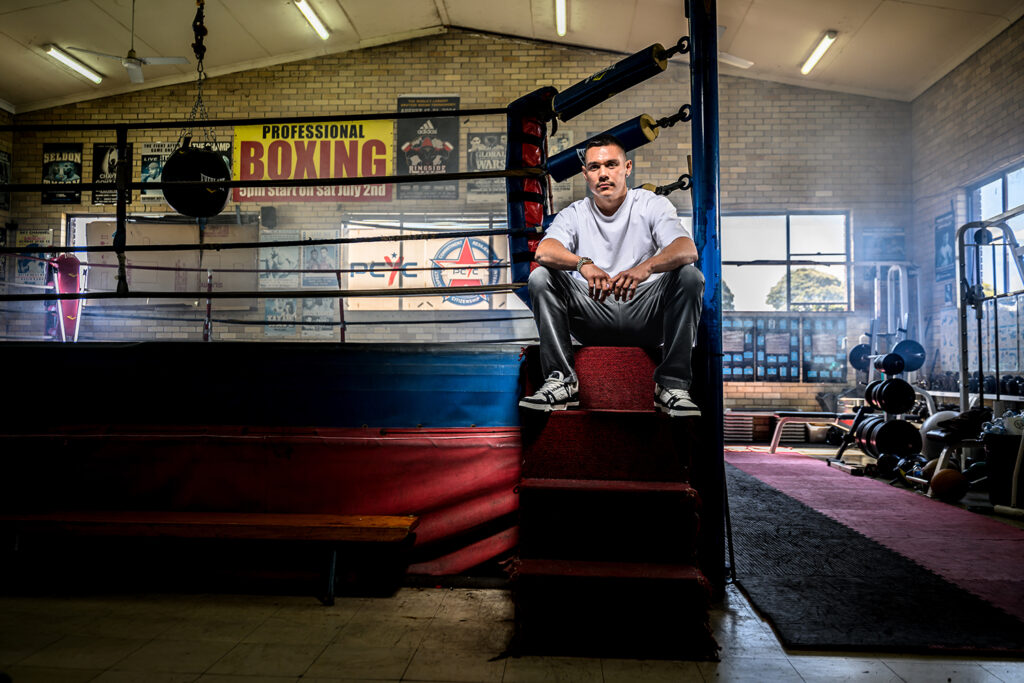
In your last fight, in March 2022, you got a shock – you were floored in the first round of your US debut, by Terrell Gausha. Did you respond well to that?
Of course. Because as soon as I bounced back up, I won every round after that. Mentally, I was able to say: Shit. Just went down. Now I’ve got to turn things around.
To have been on the canvas – what effect has that had on you as a fighter?
It’s experience. Facing adversity. Being able to recover. Not everything is always glitz and glamour. Not everything is going to go the way you want it to. Sometimes you’ve got to bounce back straight away and not let a setback drag you down.
Did it teach you something about being ready for anyone, taking nothing for granted?
I’ve never taken anyone for granted anyway.
You can’t afford to?
All it takes is one punch.
What’s Charlo going to bring to this bout?
Look, he holds all the belts. He’s the world champ for a reason. He’s experienced. He’s got power. He’s aggressive. Intelligent. They’re his strengths. But that’s the thing about boxing: there’s no fighter that’s perfect and there’s always
a weakness. The best thing about boxing is being able to expose that. So, he’s going to try and expose my weakness and I’m going to try and expose his. That’s the aim of the sport.
You know what his weaknesses are? You’re not going to discuss them, I guess, but you see them?
Of course.
Broadly…
Hit him. Hit him more than he hits me. Simple, man. People don’t realise the level of skill that I’m about to bring and show. And when he gets in the ring, he’ll realise then.
You’ve done something different for this fight by training in Thailand with a noted UFC coach, John Hutchinson.
Yep, I trained with Johnny boy and last time I brought my coach along with me. We just got back.
What have those experiences done for you?
Man, I was doing sparring rounds there with five different fresh boys that are much heavier than me in this humidity, this heat that was something I’d never experienced before. I probably dropped four kilos in sweat in one session. It was a mental battle and a physical battle going through all of that. For me, it was going back to the old-school roots of just grinding, grinding, grinding. I was running through jungles. Running up hills. The humidity . . . it takes weeks for your body to adapt.
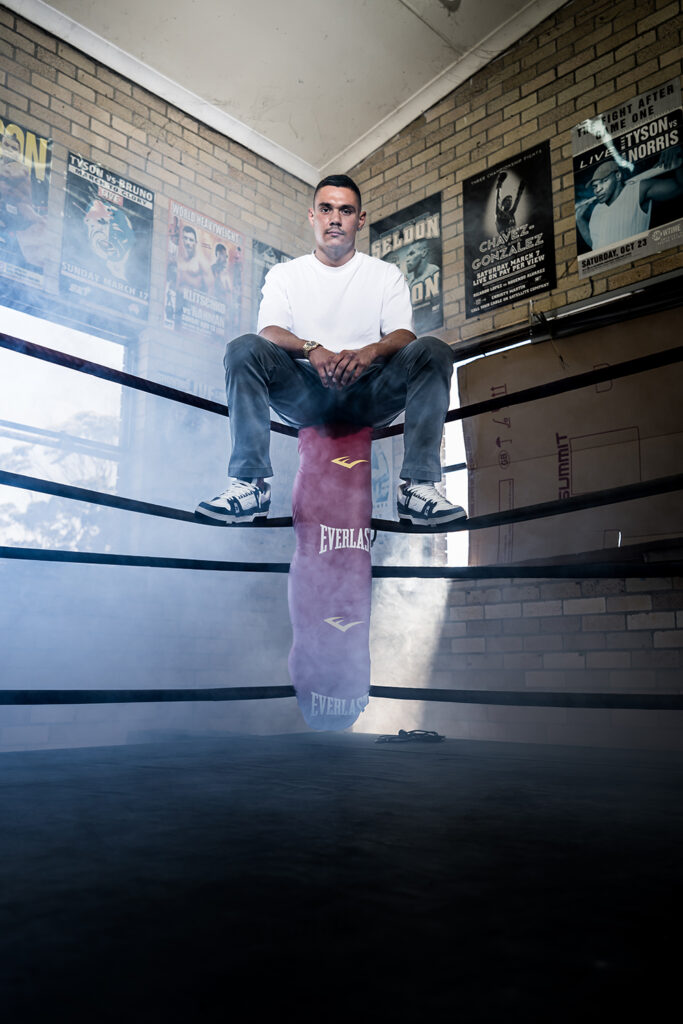
These opponents – were they boxers or UFC specialists?
Every type. They were coming in fresh, trying to take my head off.
How brave do you have to be to do what you do? Even for you, is it a bravery issue?
You have to be brave. You certainly have to be mentally strong to prepare yourself for battle. It takes a lot for someone to step into the ring and I give respect to anyone who does.
For you, is there anything that requires more bravery than fighting? I can’t imagine what it would be, but is there?
There was a quote I remember seeing. We get paid a lot of money to do this sport that we love. Of course, it takes bravery. But the ordinary person who lives week to week, the single mother who can’t afford to look after her three kids, that’s the real bravery, the really brave person out there.
“We went to private schools, but we were brought up
in the Soviet style.”
Do you love boxing? Or is it more that fighting is in your blood, that you excel at it and therefore pursue it?
It’s both. I love the brutality of it. I love the feeling of hitting people. I love the feeling of dominance. I love watching [boxing], being a spectator. The only thing I don’t love is watching my brother [Nikita].
Who’s had four pro fights. And you suffered during those?
Yeah, I had trouble watching. But besides that, I love boxing. I love watching the old-school wars.
Can you put your finger on why it’s hard to watch Nikita?
You’re not in control. That’s the thing about it.
Boxing lore is that, to succeed, you need to have grown up on the mean streets, lived a life of deprivation and hardship. But you’ve lived comfortably in Sydney your whole life and went to a private school. So, where does your hunger come from?
TT You know what? I think it was the way I was brought up. We were never spoiled as kids. We were never given anything. Whatever we had, we had to work for. We developed discipline from a very, very young age.
Did that come from both your parents?
It came from Dad. Dad was a like a military sergeant, while Mum couldn’t say anything. You know, I guess my mum changed as soon as they split. It was his way or the highway. People see all the flashy cars and nice watches, but in the background, they don’t see people waking up at 5am and eating certain foods and not being able
to go out or do this and that. That discipline was developed in us from a young age. In Year 3, I came second in cross country and I came to Dad and said, “I lost”.
That was your take on it?
Yeah. And I’ve never lost since.
And your dad would have seen it the same way: that coming second is the same as losing?
Yeah. That’s how he was. And for us, losing was never an option. Yes, we went to private schools and stuff like that, but we were brought up in the Soviet style. Mum and Dad had just come from Russia to Australia.
He had his boys training and eating like fighters?
That was the lifestyle. Soldiers. Fighters. Come 9pm, our door had to be shut. Lights out. Kids these days, it’s different. There’s no such thing [as hard discipline]. They’re probably on their iPads.
And looking back, do you say to yourself, Thanks, Dad, for screwing my childhood? Or do you say, Dad, thanks for turning me into a hard man for whom the discipline required to be a world champion is second nature?
Definitely [the latter]. [Discipline and training] are parts of me now. When I get up, I have to do something.
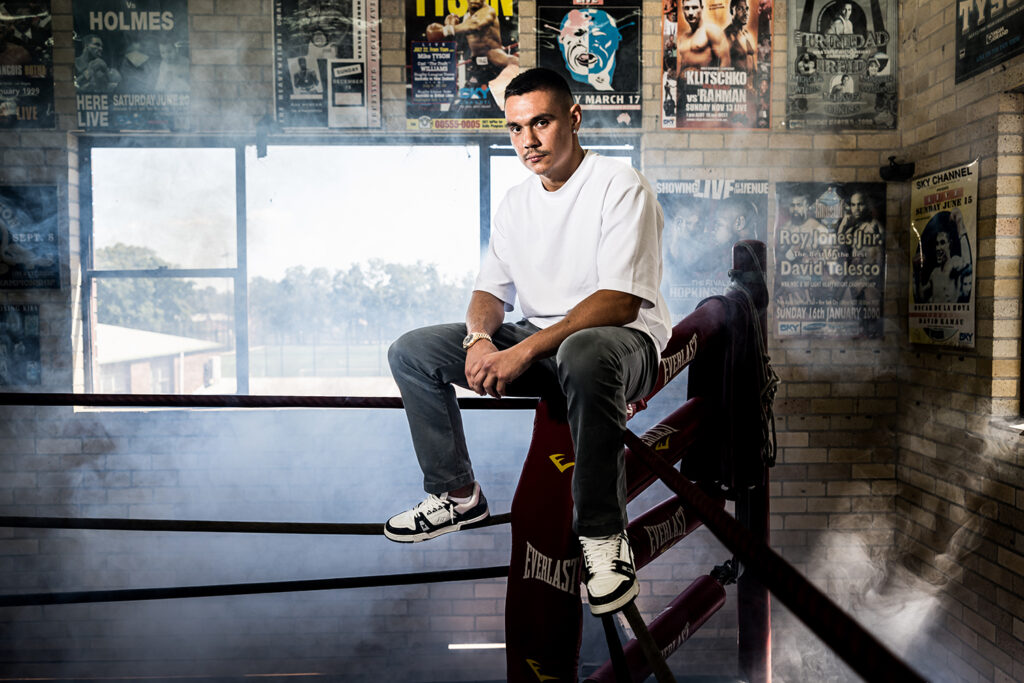
What was breakfast in those days?
I don’t remember too much about the food. I remember drinking random ginger shots
and stuff like that.
You’ve gone public with a very ambitious goal: to win world titles in multiple weight divisions all the way up to heavyweight. Are you serious?
Yeah, I am. I’m a big boy. I’m a strong boy. I feel like I can go up, up, up. But one step at a time.
But could you put on 20kg to be a heavyweight?
[Laughs] I don’t know yet. We’ll see. [Laughs louder]
I mean, you’d be stepping into the ring with Iron Mike figures.
Jab. Jab. Move and groove. Make him look like a fool.
I can certainly see you as a middleweight…
Oh, I’ll be higher than middleweight one day for sure. I spar light-heavyweights.
How long will you fight for?
Ten years maybe. I don’t have a [timeframe], but I think I’ve got 10 years left.
Maybe it’s not fair to ask a boxer about the long-term impact of his sport on his brain, but this issue is so topical. How do you deal with the risks?
Don’t get hit. I do a lot of training in the ring to not get hit.
And they’re still your dad’s last words to you before a fight?
That’s right: “Don’t get hit”.
Fighting fit
Prepping for the Big One? Do four rounds of this Tszyu-inspired circuit,
resting two minutes between rounds. Ding ding.
1/ Star jumps
Go hard for 90 sec
2/ kettlebell swings
For 50 reps. Weight’s up to you, slugger
3/ 50 push-ups
Chest to floor, maggot
4/ Shadowbox
For 90 sec, showing your full range while ducking and weaving
5/ Crunches
Till it hurts








